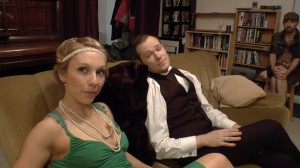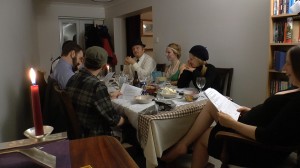Short version of the review: a few teething problems aside, we all had a wonderful time and we’d certainly consider a Daggerville game for our next murder mystery party. The characters were, on the whole, wonderful characters well-realised and fully-developed within the constraints of the genre, the twist was clever, there were moments of great hilarity (such as the point when we realised that there’d been a veritable conga-line of people stealthily following one another around the hotel), and the event built up to a fun and satisfying conclusion. I’d suggest that you all keep an eye on Daggerville in the future.
As implied earlier this week, this weekend Ruth, JTA and I had planned to host the latest in a long series of murder mystery party nights (a handful of which have been reviewed on this blog). Despite our earlier worries, we eventually filled the “missing” slots in our party with our friends Liz and Dean: exactly the couple we’d planned to fill it with in the first place, but they’d been painfully slow at RSVPing.

We’ve played a lot of murder mystery games over the years: we could probably be described as connoisseurs of the genre, and that might be worth bearing in mind when you read what we had to say about this particular event. To enumerate, there’s been:
- The entire back catalogue of Paul Lamond‘s Murder a la Carte / Inspector McClue series
- Several of D’Avekki Studios‘ Murder Mystery Party series
- A game in which nobody was murdered by Freeform Games
- And several murder mystery games that I’ve written: one in a “scripted” style, the rest in an “open” style
That said, this latest party really had the opportunity to cross the board, with Liz and Dean having never been to a murder mystery night before and (other) Liz and Simon having been to only a few. And to top it all off, we were working with a completely new game from a creator of whom we’d had no experience. What could be more exciting?

You see: I was contacted a little over two months ago, via my web form, by a Martin from Daggerville Games, a new murder mystery party provider of the “buy-and-download” variety. Upon visiting their website, I was immediately struck by some of the similarities between their signup form (which asks for player names to be associated with characters, genders to be chosen for characters whose gender can be selected based on the gender balance among the players, and email addresses to which invitations will be sent) and a prototype one of my own design, used in the construction of my upcoming games Murder at the Glam Rock Concert and Murder on the Social Network, the first of which we hope to host in about a year’s time. I mentioned this to Martin, in the hope that they won’t think I’m ripping them off if I eventually put some of my pieces online for the world to play, too.

The Daggerville folks, perhaps anticipating that I would be likely to blog about the event in hindsight and thus provide them with some free publicity, offered me a voucher for a free game of my choice, which I accepted. After a little discussion, we settled upon The Ambassador’s Notebook, a 7-player murder mystery set in a rural 1920s hotel and revolving around the untimely death of a Mr. Sullivan, presumably related to a valuable journal that was in his possession.

In order to keep the spoilers at the tail end of this blog post (there’ll be a nice big warning before you get to them, so you can refrain from reading them if you’re planning to someday play this game yourself), I’ll cut to the chase and first provide a summary of the night as a whole.

We all had a fun time: as usual for these gatherings, there was good wine, great company, and spectacular food (Ruth had, once again, put together a wonderfully thought-out and
thematically-sound menu): honestly, under these conditions we’d be pretty-much guaranteed a good night no matter what. The murder mystery itself was a scripted affair similar to those
you’ll find in any off-the-shelf kit, but with a few quirks. For a start, as hinted above, everybody gets their fragments of the script (along with dialogue entry and exit cues) very
early on: it’s possible, permitted, and even encouraged that players read their script before they arrive for the event. Some of us were concerned that this might result in
“spoilers”, and a few of those of us who did pre-read our scripts said that they regretted doing so, so be aware: it’s a spoiler-risk.

Unlike similar-styled games, though, players aren’t given additional information outside of the script, and we all felt that this made things challenging when it came to the discussion breaks. All that we had to go on for our deliberations was exactly what we’d all heard, just minutes before, tempered by our own speculation. Sometimes somebody would ask, or consider asking, a valid question after somebody’s whereabouts, alibi, or history, but no answer was forthcoming because all that we had, collectively, was the script. This caused additional confusion when, for example, Liz’s character mentioned JTA’s character by his first name, it was a surprise to everybody… even JTA, who had no idea to begin with that it was supposed to be his name!

None of the problems we experienced “broke” the game, and we found our way to a reasonably-satisfactory conclusion. A majority of us voted correctly, determining the identity of the murderer, and Ruth even managed to identify an important twist (albeit not based on anything more than speculation: the “flash” was a little subtle for us). There were a few anachronisms in the script, but they’re of the kind that only nerds like us would notice (the National Theatre is mentioned despite the fact that it won’t be founded for another four decades or so, and a character makes a reference to a frozen turkey, even though freezing of meat in the West wasn’t yet commonplace, for example). We’d have really liked to have each had a brief – even just half a page! – to tell us each more about our own characters (their names, for example, as well some of the secrets that they might be concealing and any established relationships they have with other characters), and if we knew that Daggerville were adding this feature, it’d make us far more-likely to buy their products in future.
The short review would be: a few teething problems aside, we all had a wonderful time and we’d certainly consider a Daggerville game for our next murder mystery party. The characters were, on the whole, wonderful characters well-realised and fully-developed within the constraints of the genre, the twist was clever, there were moments of great hilarity (such as the point when we realised that there’d been a veritable conga-line of people stealthily following one another around the hotel), and the event built up to a fun and satisfying conclusion. I’d suggest that you all keep an eye on Daggerville in the future.
[spb_message color=”alert-warning” width=”1/1″ el_position=”first last”]Spoiler warning: reading beyond here could result in seeing spoilers. Don’t read on if you’re likely to ever take part in a game of The Ambassador’s Notebook.[/spb_message]
Aside from the lack of character “introductions”, another thing we found difficult in this game were issues in the script. The script for “The Neighbour” ended up one-number out of sync in the middle of Scene 2, where her ‘line 42’ indicated that a different person should be talking to what the rest of the scripts said. On another occasion, the script for “The Proprietress” seemed to be missing a line (although other characters had the ‘tail end’ of that line). The character of “The Journalist” can be played by a man or a woman, and although I selected “male” when I filled in the form, some of the scripts referred to the character as a woman! At first I thought that this might be related to difficulties some of us had had receiving the emailed scripts (Martin at Daggerville was incredibly helpful at sending out fresh ones, though), but we found at least one instance in which one person flip-flopped between referring to “The Journalist” as female or male!
(there’s a video I’ve put together of some of the highlights of our evening, but there’s possible spoilers in it)

Personally, though, my favourite moment of the night came right at the start, as we all introduced our characters. One of the Liz’s, an American, had decided to play her character as an American, and introduced herself as such. “Oh,” said the other Liz, whom she’d just met, “Are you going to do an accent?”
Sweet trilby bro.
I’ve just emailed you regarding this.
My mistake – I read this too quickly.
I still think the biggest thing we were missing was character background. I pre-read my script and got a kinda-spoiler (learning something that made absolutely no sense without the context of lines not in my copy of the script).
My feeling as regards the flash wasn’t that it was too subtle, exactly, but that it dropped in without enough context to make it clearly a flash rather than a generic line. So while it contradicted an earlier statement by the murderer, it wasn’t clear that the two statements were contradictory.
If we assume the flash was the murderer’s key line “It can’t have been me who shot him, I was out running” (it wasn’t, but to avoid spoilers), then there needs to be a counterpoint somewhere earlier in the proceedings which helps lampshade the flash as long as you remember it: an incidental-seeming complaint that the doctors have put them on a strict rest cure after they tore a ligament in their knee playing tennis, say, which lets you go “WAIT a minute!” and get the Flashy goodness* once remembered. Whereas here the counterpoint was more “I run really slowly”, which doesn’t do enough to invalidate the flash statement.
But, aye, it was a nice fun evening. I’d be quite happy to try another Daggerfall. Even though I’d prefer to know my own backstory that’s still a better verdict than anything I could give the Freeform Incidentally-While-You-Were-Here-Investigating-Someone-Unfortunately-Had-A-Fatal-Heart-Attack Mysteries!
Also, we should do more of these anyway…
Twist was clever ,not easy to catch.
Paul! (Assuming you’re Pacifist Paul, not one of the other Pauls that is presumably online somewhere!) How are you? Not heard from you in forever!
I’ve probably expressed myself a bit badly – I don’t want the flash to be easy to catch exactly. I want it to be obvious enough later, when I’ve got all the information, that I kick myself for not being smart enough to get it. That’s why I think grounding the flash in context is useful. Like the Brie, the Bullet & the Black Cat, which I still think has the best one I’ve run into.
I’m going to have to spoiler this one a bit, I think, because I wasn’t very happy with my example before anyway and it’s probably not helping me to express myself properly. Spoilers therefore follow…
What I mean when I say the flash lacked context is that it relies on two facts: the murder has shaky hands and the murderer rests part of their defence on their having been painting Big Ben at a crucial moment. I’d feel better with a third fact in there, which makes it plain that the murderer (insofar as the murder and painter are the same) is meant to be a good painter, not a painter who might be so amateurish that they could paint with shaking hands and have nobody notice any difference.
My issue isn’t that the twist affecting who the murderer is is hard to spot, it’s that in retrospect there’s no real reason why someone who has shaky hands couldn’t try to paint Big Ben. (Even leaving aside the issue of what style of painting they were going for, where something impressionistic would sit quite happily with wobbly hands), there’s nothing to suggest the murderer is such a perfectionist, or has produced such an excellent, unwobbly, painting that their shaking hands make them unable to do so.
If another character had earlier complimented the murderer on, I dunno, the perfect way in which “their” painting captured the intricate patterns on a Turkish carpet, that third bit of information would combine with the shaking hands and the “painting Big Ben” claim to leave me going “Goddamn I’m stupid, I should totally have remembered that!” after the fact. I’d have stood no further chance of cracking the flash ahead of time, because my brain doesn’t work like that, but I like that “OHH of course!” moment where I feel pleasurably outsmarted. Instead my reaction was rather more “Huh. I guess shaking hands might make it a bit hard to paint?”
I think that’s not quite the same as the flash being too subtle, but the best explanation for how it’s not the same that i could find was that it lacked the context that makes it clear it is a flash (in this case, previous evidence that the painter was a competent and skillful artist who would be incapable of bringing themselves to paint if their hands shook – without that I think we all found there was no reason to believe someone with wobbly hands, who might well be a lousy artist anyway, shouldn’t attempt to paint something.)
I don’t particularly want things to be made more obvious, I just like them to be obvious in retrospect so I can admire how easily I was gulled. But, as I say, that’s a minor quibble and it bugged me less than my character only learning his secret three quarters of the way through despite presumably knowing it from the start. And there was a murder, and it was pretty sneakily done at that, without confusing DVDs or embarrassing notes about “what the people (if they were real) might have counted as murder rather than manslaughter if they’d actually been in this situation at this time actually”, so I can’t say I didn’t have a fun time of it!
Not Pacifist Paul; I suspect that this Paul is this guy, not that you get much from that page.